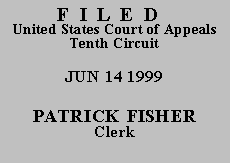

| RICKEY ROBINSON, |
|
| v. | |
| KENTUCKY FRIED CHICKEN, |
Plaintiff Rickey Robinson, appearing pro se, brought this action alleging that his employer, defendant Kentucky Fried Chicken (KFC), discriminated against him on the basis of his race in violation of 42 U.S.C. §§ 2000e to 2000e-17 (Title VII), and that it unlawfully retaliated against him after he filed complaints of discrimination. He now appeals the district court's grant of summary judgment in favor of KFC. We affirm.
Mr. Robinson's complaint alleges that he was taken off a management training program and denied readmittance because he had filed a discrimination case against KFC. In addition to the retaliation claim related to management training, Mr. Robinson also complains that KFC terminated him because he was a "troublemaker," and he further alleges that he was discriminated against because of his race.(1) R. Vol. I, Tab 1 at 2.
According to the undisputed facts,(2) Mr. Robinson was employed by KFC from December 1990 until his termination on July 16, 1997. During the period he worked at KFC, two of his managers and two outside supervisors determined that he was unable to perform the basic tasks required for management training. The noted deficiencies included problems with: 1) accomplishing inventory of chicken and cash, 2) operating the cash register, 3) interacting with customers; and 4) working the drive-thru window. Additionally, he violated the employee meal policy and disobeyed a direct instruction to comply. The district court found that Robinson had failed to produce any evidence to counter KFC's evidence that its actions were based upon legitimate, nondiscriminatory business reasons. Therefore, the district court granted KFC's motion for summary judgment.
We review the grant of summary judgment de novo, using the same standard as the district court under Fed. R. Civ. P. 56(c). Siemon v. AT&T Corp., 117 F.3d 1173, 1175 (10th Cir. 1997). "Summary judgment is appropriate if 'there is no genuine issue as to any material fact and . . . the moving party is entitled to a judgment as a matter of law.'" Id. (quoting Fed. R. Civ. P. 56(c)). We examine the factual record and the inferences reasonably drawn from the facts in the light most favorable to the party opposing summary judgment. Applied Genetics Int'l, Inc. v. First Affiliated Sec., Inc., 912 F.2d 1238, 1241 (10th Cir. 1990).
In this appeal, Robinson complains that KFC was not required to produce any documents which would have substantiated his claim. However, inasmuch as there is no record of Robinson's having requested any such production before the district court, we do not consider this claim for the first time on appeal. Walker v. Mather (In re Walker), 959 F.2d 894, 896 (10th Cir. 1992). We have carefully reviewed the pleadings and briefs, the record on appeal, and the district court's decision, and we have considered them in light of the applicable law. On October 30, 1998, the district court issued a thorough, well-reasoned order granting summary judgment to KFC. R. Vol. I, Tab 16. We affirm that order for substantially the same reasons stated therein.
AFFIRMED.
ENTERED FOR THE COURT
Stephen H. Anderson
Circuit Judge
*.This order and judgment is not binding precedent, except under the doctrines of law of the case, res judicata, and collateral estoppel. The court generally disfavors the citation of orders and judgments; nevertheless, an order and judgment may be cited under the terms and conditions of 10th Cir. R. 36.3.
1.Both KFC and the district court interpreted this allegation to encompass a claim of illegal discrimination and retaliation related to Mr. Robinson's termination. See Hall v. Bellmon, 935 F.2d 1106, 1110 (10th Cir. 1991).
2.These facts were presented by affidavits attached to KFC's summary judgment motion. Mr. Robinson never responded to the motion.